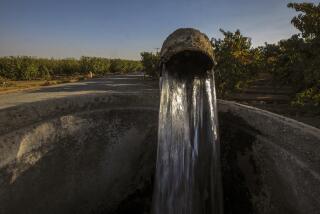Water Woes Persist
- Share via
Down through the years in California, there was nothing like a little drought to rally support for grand water projects. But the drought of 1987-89 has had no such visible effect. There is no unity behind a statewide water policy that would meet the needs of the 21st Century. Most water agencies are facing greater demands on the same supplies they had several years ago. The old feud between Northern California and the South has flared up again. A new battle is brewing between cities and farmers over water.
The California water situation has become so muddled that W. Don Maughan, chairman of the state Water Resources Control Board, has suggested that Gov. George Deukmejian and the Legislature get more involved in the debate. Given their sorry record on water issues in the 1980s, that might be considered a desperate move. But Maughan has a point if, and only if, the Legislature and the executive can enter the debate on a base of realism, having put rigid old positions behind them.
Maughan noted that the California Water Plan has changed little since it was written in 1957 as the basis for the State Water Project. The plan worked under the assumption that California had enough water from traditional sources to serve all needs. It envisioned a project that would deliver more than 4 million acre-feet of water by the 21st Century. The project now is capable of producing only about half that goal, and there are no substantial new sources of water on the horizon.
State officials should reexamine the old assumptions and “see what they really want to do,” Maughan said. A symptom of the problem could be found in the effort of Maughan’s board the past two years to set new water-quality standards in the Sacramento-San Joaquin Delta. The delta is the estuary that feeds San Francisco Bay and also supplies the State Water Project and the federal Central Valley Project that export massive amounts of water to customers from the San Francisco Bay Area to San Diego. While Southern California has counted on getting more water from the delta, the board’s draft plan proposed a cutback in deliveries to the South in order to protect the delta environment. That outraged Southern California water managers, yet failed to satisfy Northern Californians, who wanted even more water to remain in the delta and the bay.
The plan is being redrafted, but there is not enough water to meet all requests. Environmental demands on California water are growing, and have gained increasing validity through court rulings and political proselyting. The expanding populations of both Northern and Southern California will need more water. Ironically, the 1987-89 drought has demonstrated that the region least able to sustain a prolonged shortage is the San Francisco Bay Area, which long had been isolated and comfortable with its direct pipelines into the Northern Sierra, including Yosemite National Park. As an increasing consumer of the state and federal projects, Northern California has become a major delta customer right alongside Southern California.
Booming Sacramento also is feeling the water pinch although city officials still refuse to install water meters in homes. Sacramentans use a third more water than Los Angeles residents, but northerners still complain about Angelenos wasting water on swimming pools and lush lawns.
In spite of all this, water officials from urban coastal cities from San Francisco to San Diego have formed a coalition to push for water project additions. This has put California agriculture on the defensive, for it still uses more than 80% of all the state’s developed water supply. A relatively minor reduction in farm water use would solve urban water problems for decades. But for that to occur, California would need a virtual revolution in water policy.
The immediate future will require better management of the water California has now and stringent conservation by all users all the time--not just in drought years. These goals certainly would be easier to achieve if Sacramento could manage to unite on some reasonable long-term policy guidelines.
More to Read
Sign up for Essential California
The most important California stories and recommendations in your inbox every morning.
You may occasionally receive promotional content from the Los Angeles Times.










